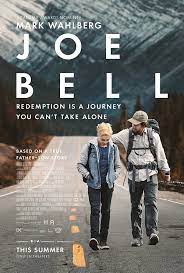
JOE BELL
US, 2020, 93 minutes, Colour.
Mark Wahlberg, Reid Miller, Connie Britton, Maxwell Jenkins, Gary Sinise, Morgan Lily.
Directed by Reinaldo Marcus Green.
One could hardly find a plainer name for the central character of this biographical film. However, the screenplay is based on actual events, an Oregon worker, Joe Bell.
Most audiences will not know Joe Bell story, and so it will be something of a journey of discovery, as we find him involved in a walk across the United States from west to east. He has only himself, a backpack (although well-wishers along the way give him a trolley). And, he is played by Mark Wahlberg, so he seems to be what one might call a 21st century American Everyman.
But, as he walks, he is accompanied by his son, Jadin (Reid Miller), teenage, supporting his father, arguing with his father, appearing and disappearing. This reviewer was rather slower than many audiences in a dawning as to the true nature of Jadin accompanying his father. Something of a shock, in fact, especially in the context of where we realise what is happening, Joe venturing into a gay bar.
Yes, the theme of the film and of Joe Bell’s walk in 2013 is homophobia and bullying. As might be expected, Joe is often too quick off the mark with his emotional reactions, not always understanding well what is going on. Jadin is gay, is bullied at school, takes his life (and the device of his being seen to accompany Joe on the walk, have conversations, challenge his father about his own behaviour, her eventually seeing a bullying episode, means that we are much more aware of and sympathetic to Jadin and understanding his father’s walk).
But, as he walks, Joe takes opportunities to address groups, school children, alerting them to the realities of sexual orientation, a campaign against bullying. While is not the most articulate of speakers, his message is listened to. In the meantime, he is in continual contact with his wife (Connie Britton) and the younger son, Joseph (Maxwell Jenkins), who is also a challenge to his father.
A number of people on the way are puzzled by Joe, engaging conversation with him, learn something about him – and audiences will appreciate a later part of the film where Joe meets a local policeman, played by Gary Sinise, where the screenplay gives them an opportunity for more personal and deeper discussion.
The film invites audiences, especially fathers, to identify with Joe Bell and his experiences, the steps to appreciating his son, challenge to parental expectations, especially in sexual orientation.
American audiences who know the story of this walk will be anticipating the ending. Most audiences, unfamiliar with the story, will find an emotional challenge at the end of the film.
It is interesting to see Mark Wahlberg moving from an action film to a more sympathetic role, a chance to show more humanity. And, also interesting, are the writing and directing credits. The screenplay was written by veteran Larry McMurtry (Lonesome Dove and many westerns) and a long time associate, Diana Ossana (winning screenwriting Oscar with Larry McMurtry for Broke back Mountain). The director, Reinaldo Marcus Green, directed a strong drama about crime in American city streets, Monsters and Men (where those accused of police killings are denounced as monsters whether the case was proven or not). It is well worth seeking out. Green is also the director of the forthcoming King Richard, the story of Richard Williams, father of Venus and Serena Williams.
- Title? A plain American name? A plain American character? An ordinary American man?
- The Oregon settings, the Bell household, home, school? Joe Bell and his walk, across the United States, the variety of states between Oregon and Utah? The musical score?
- The introduction to Joe Bell, Mark Wahlberg, age, tough, gradual revelation of his background, his work, working class, relationship with his wife, his sons, demands on his family, short fuse? Tensions with his wife? His relationship with Jadin? The contrast with his relationship with Joseph?
- Joe, seen walking, gradual revelation of why he was walking, the plan to go from west to east across the US, his campaign, against homophobia? Seen walking with Jadin, their conversations, memories of the past, Joe and his giving talks to any group that would listen, Jadin seen at the back of the hall? The situation of the gay club, the discussion with Jadin, Jadin urging him, Jadin not going in?
- The conversations in the gay club, an opportunity for Joe to reflect on his attitudes, to listen attentively to others?
- The audience realising that Jadin was dead, that he was the reason for the walk, that he was there in Joe’s imagination, memory, his dialogue with his dead son?
- The flashbacks, Jadin, his age, in the house, study, sport, his being bullied, suicidal, the issue of his sexual orientation, acceptance, his father’s short fuse, trying to understand? The impact of the bullying, the visuals, the crowd, and Jadin dying?
- Joe, the phone calls to his wife, memories of the death, bitterness? The coming out to meet him, the time together, Joseph, his relationship with his father, talking? Audiences understanding the pressure of this experience on Joe’s wife?
- Joe continuing his walk, the various people that he met, explaining himself, the school groups, the social groups, people willing for him to speak, to listen? The gift of the trolley for him to carry his wares? His dossing down in various places, determined to complete the walk?
- The encounter with the sheriff, initial suspicions, the sheriff’s character, willing to listen, the discussions, the accommodation? The encounter with the sheriff giving time for the audience to understand more deeply, Joe, his character, his experiences, his motivations?
- The shock of the accident, his death?
- A true story, of 2013, American heritage, a stand against homophobia which has universal interest?